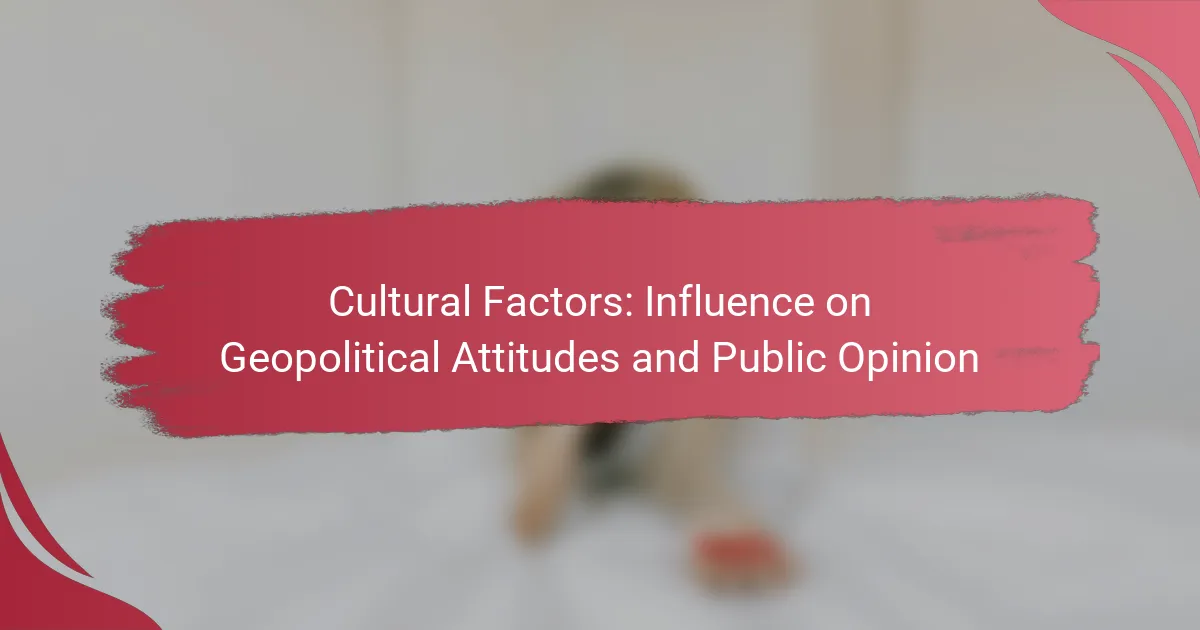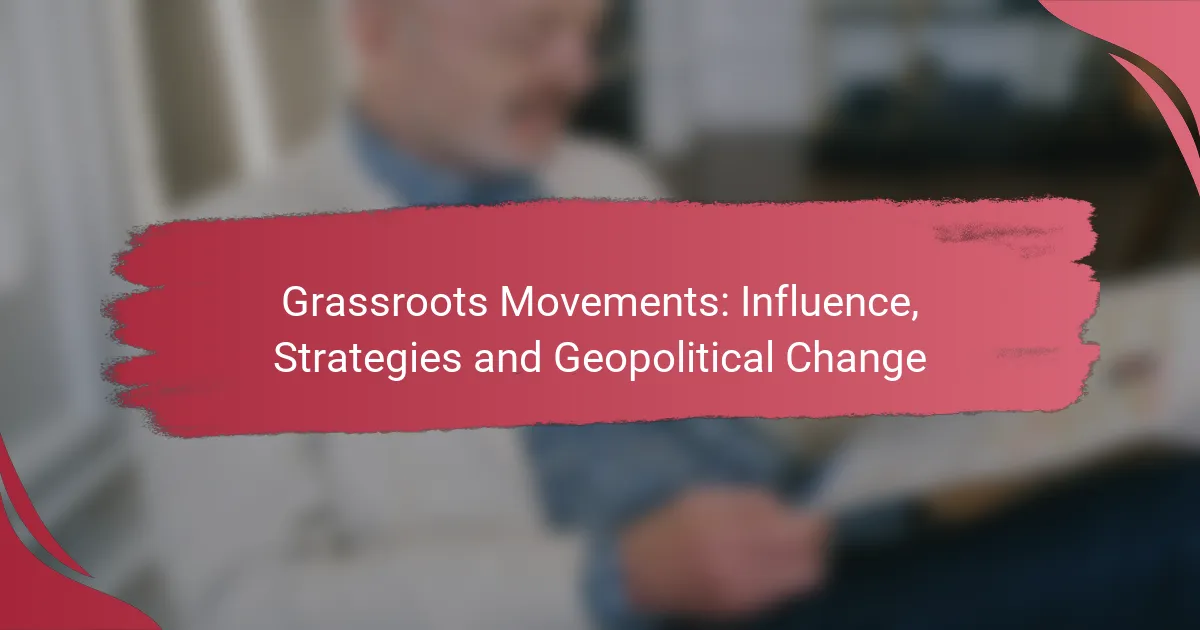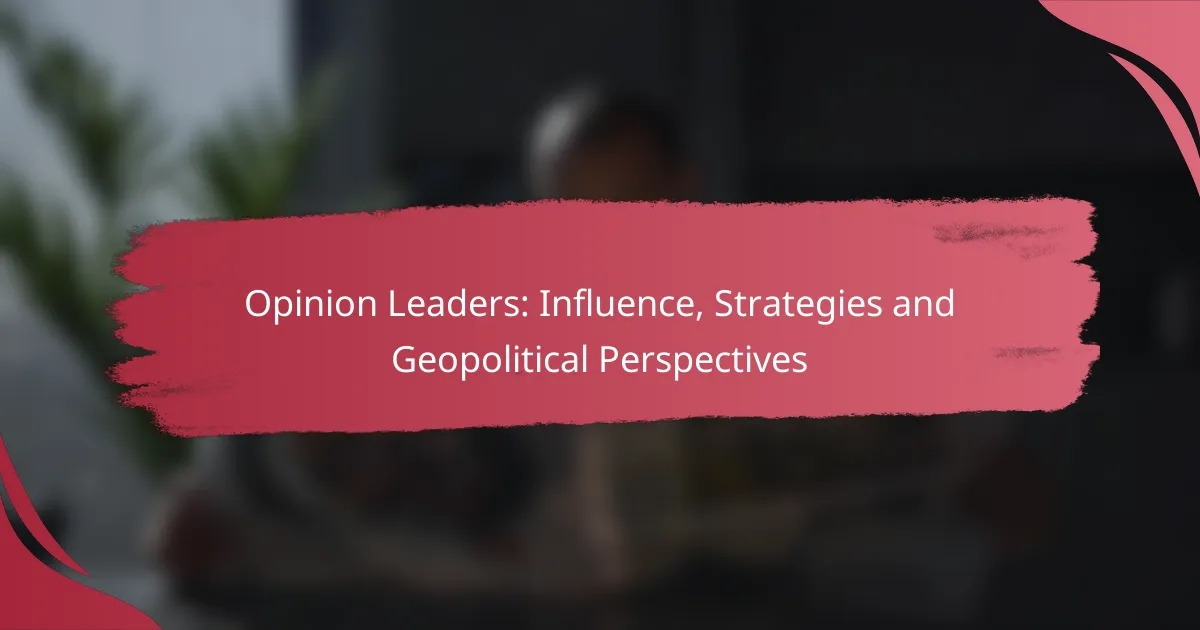Cultural factors play a crucial role in shaping geopolitical attitudes and public opinion by influencing how societies interpret global events and policies. Elements such as national identity, historical narratives, and cultural values inform individual and collective perceptions, ultimately affecting international relations and diplomatic interactions. Understanding these influences is vital for navigating the complexities of global communication and conflict resolution.
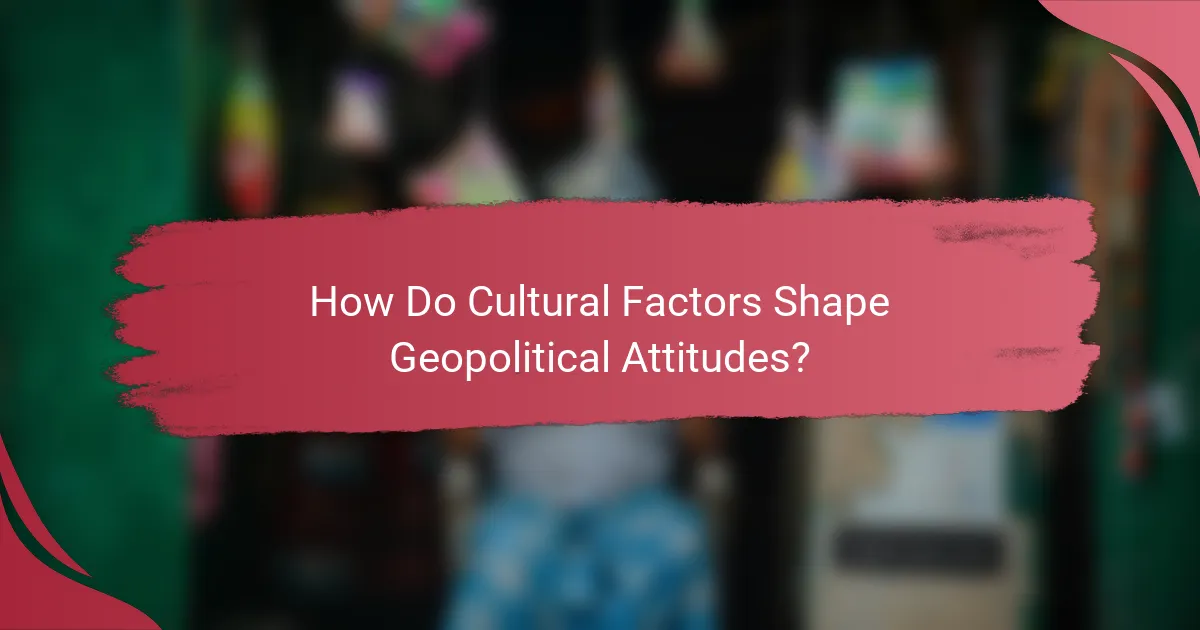
How Do Cultural Factors Shape Geopolitical Attitudes?
Cultural factors significantly influence geopolitical attitudes by shaping how individuals and societies perceive global events, policies, and international relations. These factors include national identity, historical narratives, and cultural values, all of which contribute to public opinion and national perspectives on global issues.
Influence of national identity
National identity plays a crucial role in shaping geopolitical attitudes as it defines how individuals view their country in relation to others. A strong sense of national identity can foster patriotism, leading to support for government policies that prioritize national interests, even at the expense of international cooperation.
For example, countries with a robust national identity may resist foreign influence and advocate for policies that protect local industries. This can manifest in public support for tariffs or trade restrictions against perceived threats from other nations.
Role of historical narratives
Historical narratives significantly impact how societies interpret current geopolitical events. Collective memories of past conflicts, alliances, and colonial experiences can shape attitudes toward foreign nations and influence public opinion on international relations.
For instance, countries with a history of colonialism may have a skeptical view of Western powers, affecting their stance on global governance and international aid. Understanding these narratives is essential for policymakers to navigate complex international landscapes.
Impact of cultural values
Cultural values, such as individualism versus collectivism, also shape geopolitical attitudes by influencing how societies prioritize issues like human rights, economic development, and environmental protection. Societies that value individualism may emphasize personal freedoms in their foreign policy, while collectivist cultures might prioritize community welfare and stability.
Moreover, cultural values can affect public response to global crises. For example, a society that values humanitarianism may advocate for intervention in humanitarian crises, while another that prioritizes sovereignty may resist such actions. Recognizing these cultural underpinnings is vital for effective diplomacy and international collaboration.
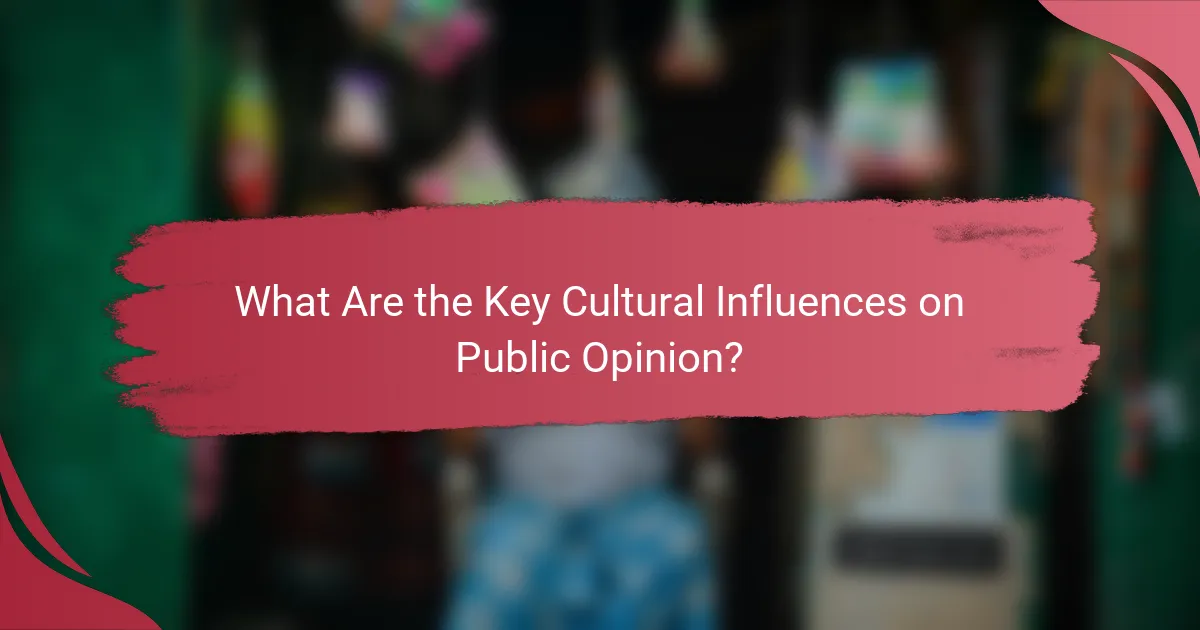
What Are the Key Cultural Influences on Public Opinion?
Cultural influences shape public opinion by affecting how individuals perceive issues, events, and policies. Factors such as media representation, education systems, and religious beliefs play significant roles in forming attitudes and opinions within different societies.
Media representation
Media representation significantly impacts public opinion by framing narratives and shaping perceptions of various issues. The way news outlets portray events can influence audience attitudes, often emphasizing certain perspectives while downplaying others. For instance, biased reporting on immigration can lead to polarized views among the public.
Moreover, the rise of social media has transformed how information is disseminated, allowing for rapid spread of both accurate and misleading content. This shift necessitates critical media literacy to navigate and assess the reliability of sources.
Education systems
Education systems play a crucial role in shaping public opinion by instilling values, critical thinking skills, and knowledge about civic responsibilities. Curricula that emphasize global citizenship and cultural awareness can foster more inclusive attitudes among students. Conversely, education that lacks diversity may perpetuate stereotypes and narrow viewpoints.
In many countries, the quality of education can vary widely, affecting how well individuals understand complex geopolitical issues. Engaging students in discussions about current events can enhance their ability to form informed opinions.
Religious beliefs
Religious beliefs can profoundly influence public opinion, often guiding moral perspectives and social values. Different faiths may have distinct views on issues such as social justice, environmental stewardship, and international relations, shaping followers’ attitudes accordingly. For example, religious teachings may encourage compassion towards refugees or promote conservative views on family structures.
In regions where religion plays a central role in daily life, public opinion may align closely with religious doctrines. Understanding these influences is essential for policymakers aiming to address community concerns effectively.
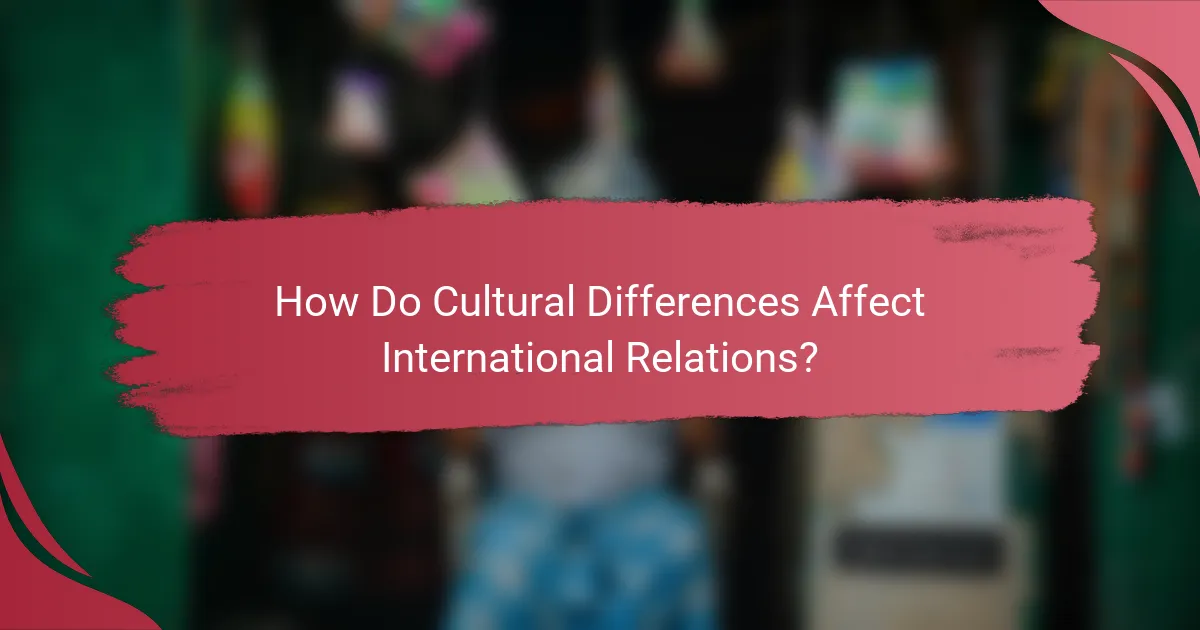
How Do Cultural Differences Affect International Relations?
Cultural differences significantly influence international relations by shaping how countries communicate, negotiate, and resolve conflicts. Understanding these cultural factors is essential for effective diplomacy and fostering positive global interactions.
Communication styles
Communication styles vary widely across cultures, impacting how messages are conveyed and interpreted. For instance, some cultures prioritize direct communication, valuing clarity and straightforwardness, while others may favor indirect approaches, emphasizing context and non-verbal cues.
Recognizing these differences can prevent misunderstandings. For example, in high-context cultures like Japan, silence may indicate thoughtfulness, whereas in low-context cultures like the United States, it might be perceived as discomfort or disagreement.
Negotiation tactics
Negotiation tactics are often influenced by cultural norms and values. In some cultures, building relationships and trust is crucial before discussing terms, while others may focus on the deal itself from the outset. For example, in many Middle Eastern cultures, establishing personal connections can be essential for successful negotiations.
Understanding these tactics can lead to more effective negotiations. A practical approach is to research the cultural background of your negotiation partners and adapt your strategy accordingly, whether it involves patience in relationship-building or a more transactional focus.
Conflict resolution approaches
Cultural factors also shape how conflicts are resolved. Some cultures prefer collaborative approaches, seeking consensus and harmony, while others may adopt more competitive strategies, emphasizing winning over compromise. For instance, Scandinavian countries often prioritize mediation and dialogue, whereas some Western cultures may lean towards litigation.
To navigate these differences, it’s beneficial to identify the preferred conflict resolution style of the involved parties. This can guide the choice of methods, whether fostering dialogue or preparing for more adversarial tactics, ensuring a more constructive outcome.
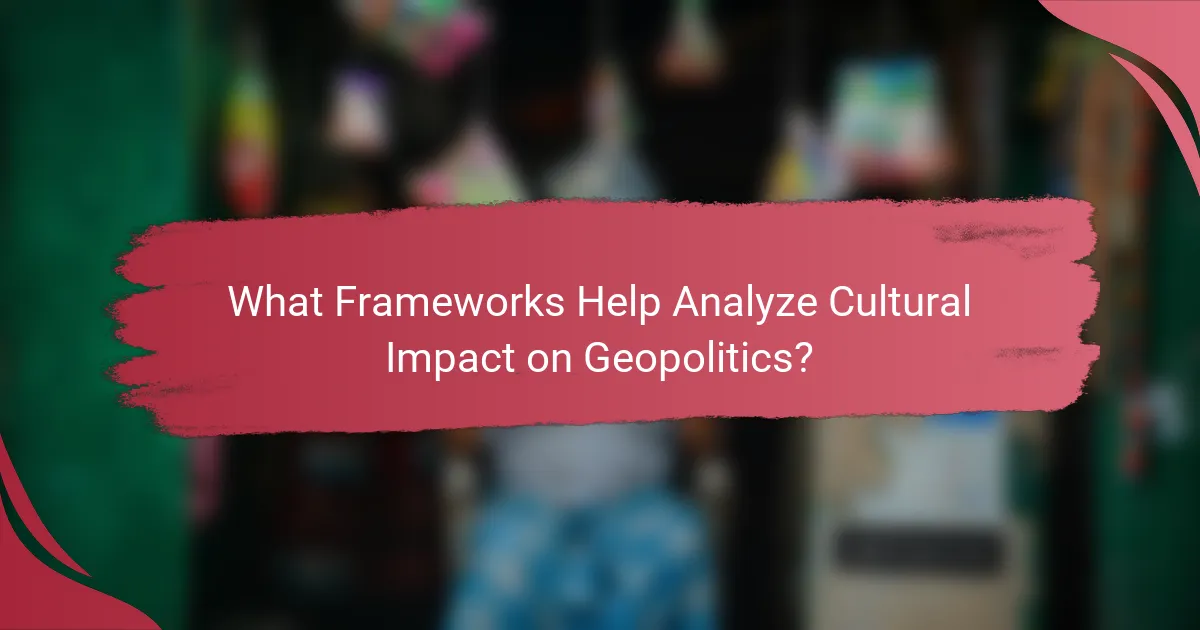
What Frameworks Help Analyze Cultural Impact on Geopolitics?
Several frameworks exist to analyze how cultural factors influence geopolitical attitudes and public opinion. These frameworks provide insights into the underlying cultural dynamics that shape international relations and domestic perceptions.
Cultural dimensions theory
Cultural dimensions theory, developed by Geert Hofstede, identifies key cultural values that affect behavior and attitudes across different societies. This framework includes dimensions such as individualism versus collectivism and uncertainty avoidance, which can influence how nations perceive and interact with one another.
For example, countries with high individualism may prioritize personal freedom in foreign policy, while collectivist cultures may emphasize community and national solidarity. Understanding these dimensions can help diplomats and policymakers tailor their approaches to resonate with specific cultural contexts.
Soft power metrics
Soft power metrics assess a country’s ability to influence others through attraction rather than coercion, often through culture, values, and foreign policies. Key components include cultural exports, educational exchanges, and international media presence, which can enhance a nation’s image and sway public opinion abroad.
For instance, countries that invest in cultural diplomacy, such as hosting international events or promoting their arts, can improve their soft power. Monitoring these metrics helps governments understand their global standing and adjust strategies to enhance their influence effectively.
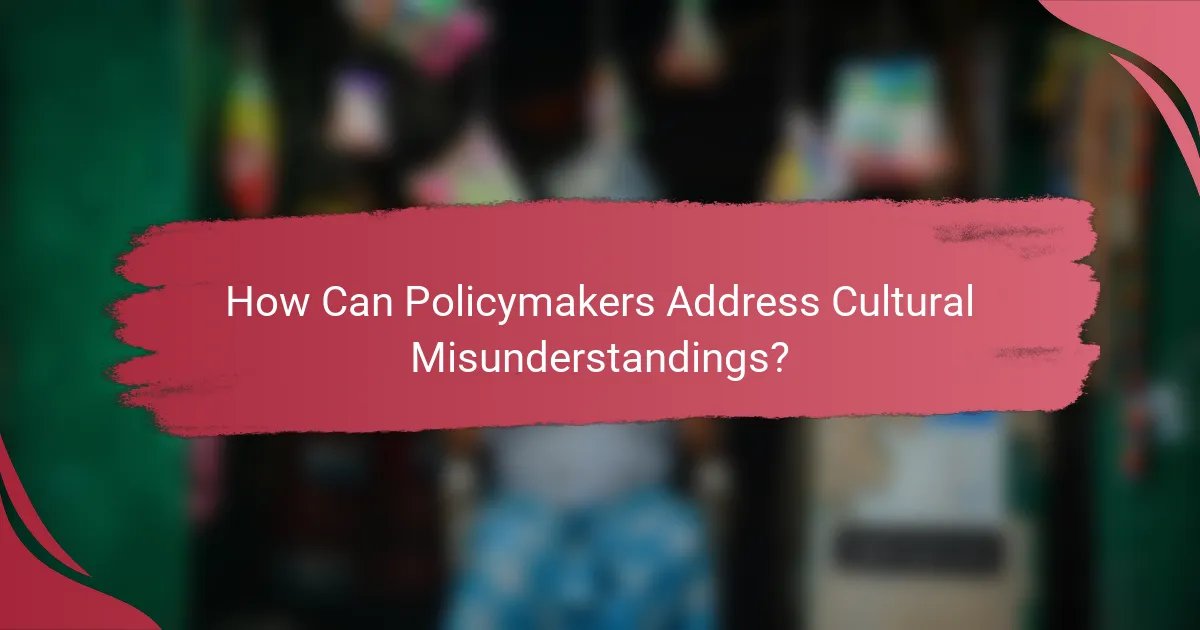
How Can Policymakers Address Cultural Misunderstandings?
Policymakers can address cultural misunderstandings by implementing strategies that foster awareness and appreciation of diverse cultural perspectives. Effective approaches include cross-cultural training programs and public diplomacy initiatives that promote dialogue and understanding among different communities.
Cross-cultural training programs
Cross-cultural training programs equip individuals and organizations with the skills to navigate cultural differences effectively. These programs often include workshops, simulations, and role-playing exercises that highlight communication styles, values, and norms of various cultures.
For instance, businesses operating internationally may conduct training sessions for employees to better understand local customs and etiquette, which can enhance collaboration and reduce conflicts. Policymakers should consider tailoring these programs to specific cultural contexts to maximize their relevance and effectiveness.
Public diplomacy initiatives
Public diplomacy initiatives aim to engage foreign audiences and build mutual understanding through cultural exchange and communication. These initiatives can include cultural festivals, educational exchanges, and media outreach that showcase a country’s values and traditions.
For example, a government might sponsor art exhibitions or film festivals that highlight its cultural heritage while inviting foreign participants to share their own traditions. Such initiatives not only improve international relations but also foster a sense of community and shared values among diverse populations.
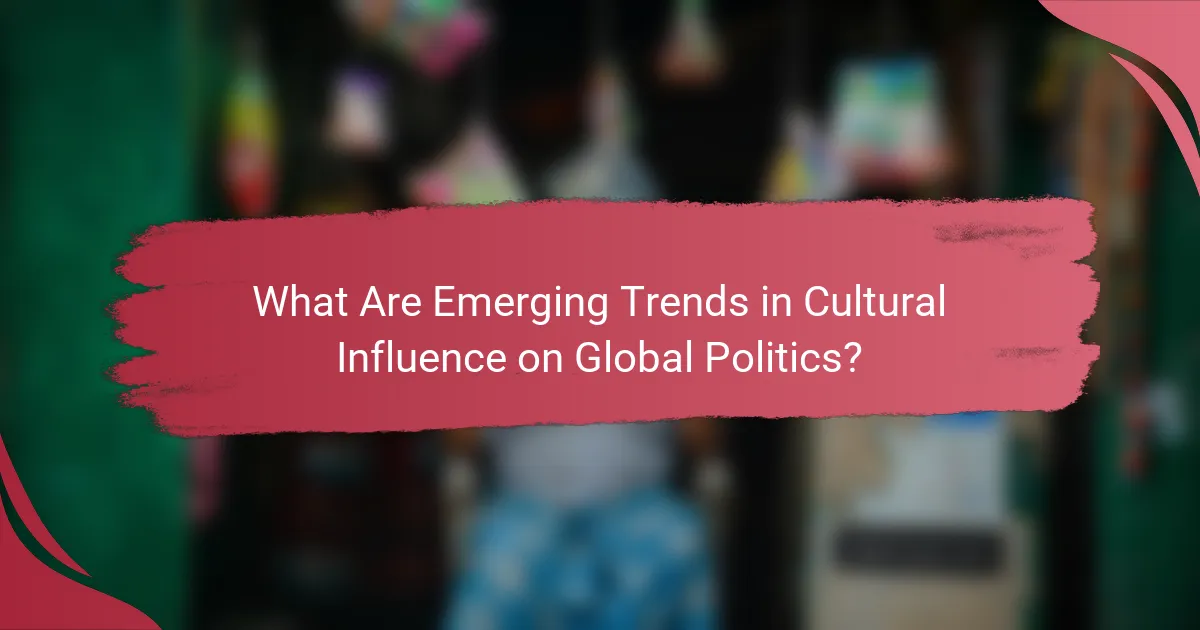
What Are Emerging Trends in Cultural Influence on Global Politics?
Emerging trends indicate that cultural factors increasingly shape geopolitical attitudes and public opinion. As societies become more interconnected, cultural narratives and values play a crucial role in influencing political discourse and international relations.
Digital media’s role
Digital media significantly impacts cultural influence on global politics by facilitating the rapid spread of information and diverse viewpoints. Social media platforms allow individuals to share their perspectives, mobilize support for causes, and challenge traditional narratives, often leading to shifts in public opinion.
For instance, movements such as Black Lives Matter and climate activism gained momentum through online campaigns, illustrating how digital platforms can amplify cultural messages and drive political change. However, the spread of misinformation can also distort public perception, making media literacy essential for consumers.
Globalization effects
Globalization enhances cultural exchange, leading to a blending of values and ideas that influence political attitudes worldwide. As cultures interact, they can adopt and adapt elements from one another, which may reshape national identities and political priorities.
For example, the global emphasis on human rights and environmental sustainability has prompted many countries to reconsider their policies. However, this cultural intermingling can also provoke backlash, as some groups may resist changes perceived as threats to their traditional values. Understanding these dynamics is vital for navigating contemporary geopolitical landscapes.
